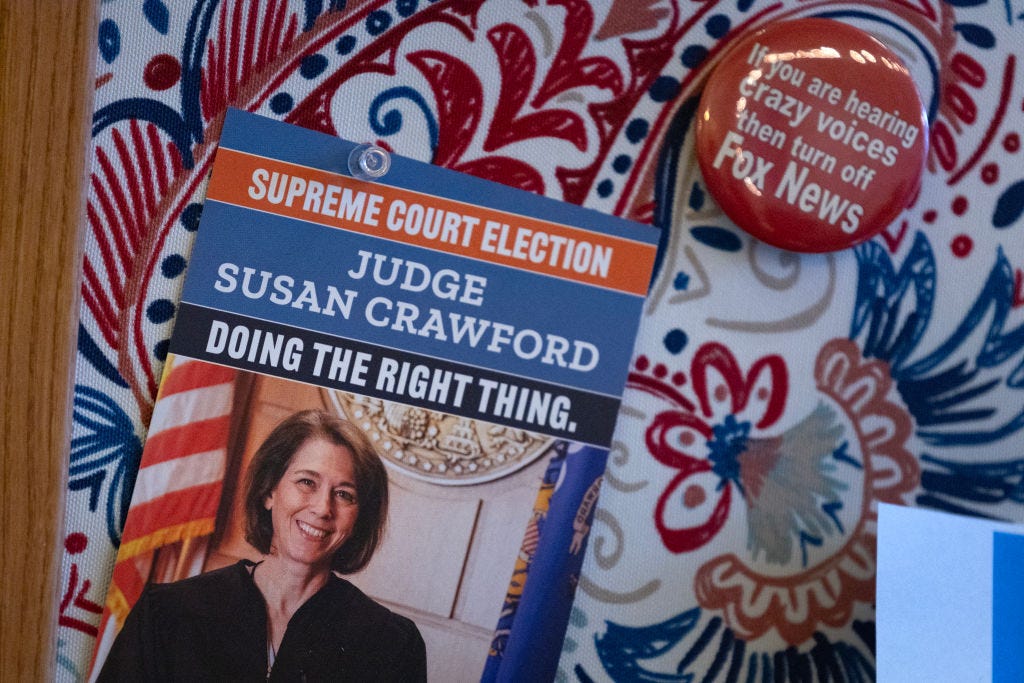
🧀 🐄 🧀With corporate outlets obeying in advance, supporting independent political media is more important right now than ever. Public Notice is possible thanks to paid subscribers. If you aren’t one already, please click the button below and become one to support our work. 🧀 🐄 🧀
At the bottom of this edition: The can’t-make-it-up tale of Mike Waltz’s Signal group
By Noah Berlatsky
Without much fanfare or coverage, Republicans have been quietly getting walloped in special elections. Almost from the moment he was elected, Trump has been an anvil around the ankles of local GOP candidates, just as he was during his first term.
One downballot race, though, is finally getting national attention. Wisconsin has an election for an open Supreme Court seat which will determine the balance of power on the court and decide whether Republicans can once again gerrymander the state to ensure one-party rule.
Trump’s billionaire henchman, President-unelect Elon Musk, has poured money into the election, ensuring that an already high-profile race will be seen as a referendum on the current administration. A win is crucial both for the people of Wisconsin and for the country as a whole.
As Musk rampages through the federal government and Trump attempts to terrorize his opponents into silence and compliance, the public, the media, the GOP, and the Democratic Party itself all need to be forcefully reminded that Trump is vulnerable, widely disliked, and can be defeated.
The stakes for Wisconsin
Wisconsin voters have already started to go to the polls to cast ballots in the April 1 contest. Though the election is in theory nonpartisan, Supreme Court races in Wisconsin have become thoroughly politicized; Susan Crawford is supported by Democrats and Brad Schimel by Republicans. (Crawford and Schimel are competing for a seat being vacated by liberal Justice Ann Walsh Bradley, who’s retiring after 30 years on the court.)
The stakes are high. The state Supreme Court rules on cases such as abortion rights. It is also likely to decide a case soon on whether public sector unions in Wisconsin can keep their newly restored right to collective bargaining.
The court also has jurisdiction over redistricting — and in the recent past conservatives on the court used that power to make Wisconsin into what was essentially a one-party state.
A note from Aaron: Working with brilliant contributors like Noah takes resources. If you aren’t already a paid subscriber, please sign up to support our work.
Republican legislators in 2011 put in place an egregiously gerrymandered map which gave them supermajorities even when they lost the popular vote. In 2012, the GOP won 48.6 percent of the statewide vote and nonetheless garnered 60 of 99 seats. In 2014, Republicans won 52 percent of the vote and won 63 seats.
The US Supreme Court refused to back up a federal court ruling that the maps were unconstitutional, and left it up to the Wisconsin Supreme Court to address the matter. Right-wingers on the state court kept the maps intact until Democrats flipped a key Supreme Court race in 2023.
The liberal majority quickly put in place fair maps, and Republicans lost 14 legislative seats in 2024. They no longer have a supermajority, which means they can no longer override Democratic Gov. Tony Evers’s vetoes. Republicans did retail control of the legislature with slim majorities, but could lose control in 2026.
Voters in Wisconsin aren’t just voting on one Supreme Court seat, then. They’re voting on fundamental rights — and also on whether they can have free and fair elections in the future. If Crawford is elected, the state remains a (fragile) democracy. If she loses, Wisconsin heads back towards authoritarian Republican rule.
The stakes for the country
Democracy for the US as a whole is also on the line in Wisconsin. The state Supreme Court could rule on voting controversies in national elections. A thoroughly MAGA-fied court, inspired by Trump’s Big Lie and conviction that Democrats don’t have the right to vote, might throw out election results it considers insufficiently Republican.
Beyond that, the race is going to be seen on a referendum on MAGA. The Trump administration is increasingly lawless; it is in the process of defying court orders and destroying independent agencies. It is also making changes to Social Security which would delay or cut benefits to millions.
Trump’s policies — including mass firings, tariffs, and other measures which seem designed to create a recession — have been very unpopular. His net approval has nose-dived since he took office, falling from +10 to -3.
And yet, major institutions across the board have struggled to locate their spines and stand up to the administration. Universities are scurrying to try to comply with Trump’s segregationist anti-DEI executive order — which is not a law, but which they fear will be used as a basis for (also lawless) funding cuts. The billionaire owners of the Washington Post and LA Times have been working to turn their once respected papers into MAGA mouthpieces. And Senate Democrats, led by Minority Leader Chuck Schumer, gratuitously caved and acquiesced to Trump’s budget demands in a depressing display of gelatinous strategic incompetence.
Part of the problem is that Trump’s narrow win in November has made him seem, well, like a winner. People and institutions fear his lawless attacks, but they also see him as a legitimate voice of the people, channeling real voter priorities on issues like immigration. In a New York Times interview, for example, Schumer talked about how focused he is on Trump’s approval numbers, and suggested Republican senators would start to work with Democrats when Trump’s numbers fell.
“Right now he’s so popular they can’t resist him,” said Schumer, who used similar talking points during an appearance last weekend on Meet the Press.
Schumer’s hopes for a GOP revolt are somewhere between wildly optimistic and delusional. But his remarks show that Democrats themselves, and others who are not Trump allies, feel cowed by and uncertain about how to handle Trump’s win, and that they are looking for signs that he is weakening. Trump losses can inspire more people to fight. Trump wins will buttress his air of invulnerability, and lead people like Schumer to continue to stall and wait to resist — which helps Trump build even more power.
Everyone is aware of this dynamic, which is why the Wisconsin Supreme Court race has become a national battleground. Elon Musk has funded some $13 million in attack ads against Crawford, and has urged people to vote against her on his rightwing social media hellsite X. (Musk is also offering voters $100 if they sign a petition opposing “activist judges.”) Progressive billionaires have also donated in lesser amounts; George Soros gave $1 million to Wisconsin Democrats.
Overall spending in the race is expected to top $100 million, breaking the record for state supreme court races set by the 2023 Wisconsin contest.
MAGA keeps underperforming in off years
Crawford has been aggressively tying her opponent to Musk, who is very unpopular, with a net approval of -12 in a recent poll. Polling of the Supreme Court race itself is sparse, though; a March 9-10 survey showed the candidates tied at 47-47 apiece.
Democrats have some reason for hope based on Trump’s first term, when he was a downballot disaster for Republicans. The GOP experienced sweeping losses in November 2017, 2018, and 2019. They lost both chambers of the Virginia legislature; they lost the governorship of deep red Kentucky. In a shocking special election upset in 2017, they lost a US Senate seat in Alabama. (Remember Roy Moore?)
It’s early in Trump’s term, but his unique gift for poisoning the GOP in state and local elections appears to be holding. In January, Democrats held onto control the state legislature in Virginia; two Democrats slightly overperformed Kamala Harris to win their election, while Republican Luther Cifers won a Republican held seat by 18 — underperforming Trump by 11 points. Republicans also underperformed in an Iowa state House election, which shifted 24 points towards Democrats (though the GOP still eked out a win).
In another hopeful sign, Democrats have had remarkably strong fundraising in a Republican-leaning, usually uncompetitive US House seat in Florida. There are two special House elections in the state on April 1.
None of this guarantees a win in the Wisconsin race, of course. The US electorate by now has convincingly demonstrated its ability to choose diarrhea forever over everyone gets a puppy and to vote away its own rights and democracy. The Wisconsin election is a chance to start turning the country away from authoritarianism and to inspire people to fight. This won’t be the last battle. But democracy could sure use a win right now.
But their text messages
By Aaron Rupar
If you somehow missed it yesterday or weren’t able to find a non-paywalled version, I want to share with you what may perhaps be the definitive piece of journalism about the early months of the second Trump administration — Atlantic Editor-in-Chief Jeffrey Goldberg’s account of being included in a Signal group chat with senior Trump administration officials where Defense Secretary Pete Hegseth shared detailed plans for military strikes against the Houthis.
You can find a gifted story link in the Bluesky post below. And if you haven’t already taken 15 minutes to read it, make sure you do when you can.
As I write this late Monday, there are still a lot of big unanswered questions swirling about this epic OPSEC disaster. Among them — why in god’s name are senior Trump national security officials using Signal for highly sensitive military planning in the first place? Did National Security Adviser Mike Waltz include Goldberg in the group chat by accident, or was something else going on? How did Hegseth get classified war plans onto an unsecured device? To what extent was President Trump looped in about all this (he wasn’t in the group chat), or are his top aides really making big decisions on their own? Why was Hegseth comfortable blatantly lying in his first public comments about the scandal? (See below.)
And finally, will Hegseth and/or Waltz lose their jobs, or will the administration just ride it out as Trump has following so many previous instances of misconduct? (We know heads would roll if something like this happened in a Democratic administration — but her emails! — but unfortunately we also know Republicans are held to much, much lower standards.)
We’ll be monitoring those questions and more in the days and weeks to come as we cover this story, which in any event provides one of the clearest illustrations of the toxic stew of malevolence and ignorance that is MAGA. Truth really is stranger than fiction sometimes.
And if you have any takes or questions you’d like to share, sound off in the comments. I’ll monitor them through the day.
That’s it for today
We’ll be back with more tomorrow. If you appreciate today’s newsletter, please support our work by signing up. Paid subscribers make PN possible.
Thanks for reading.











